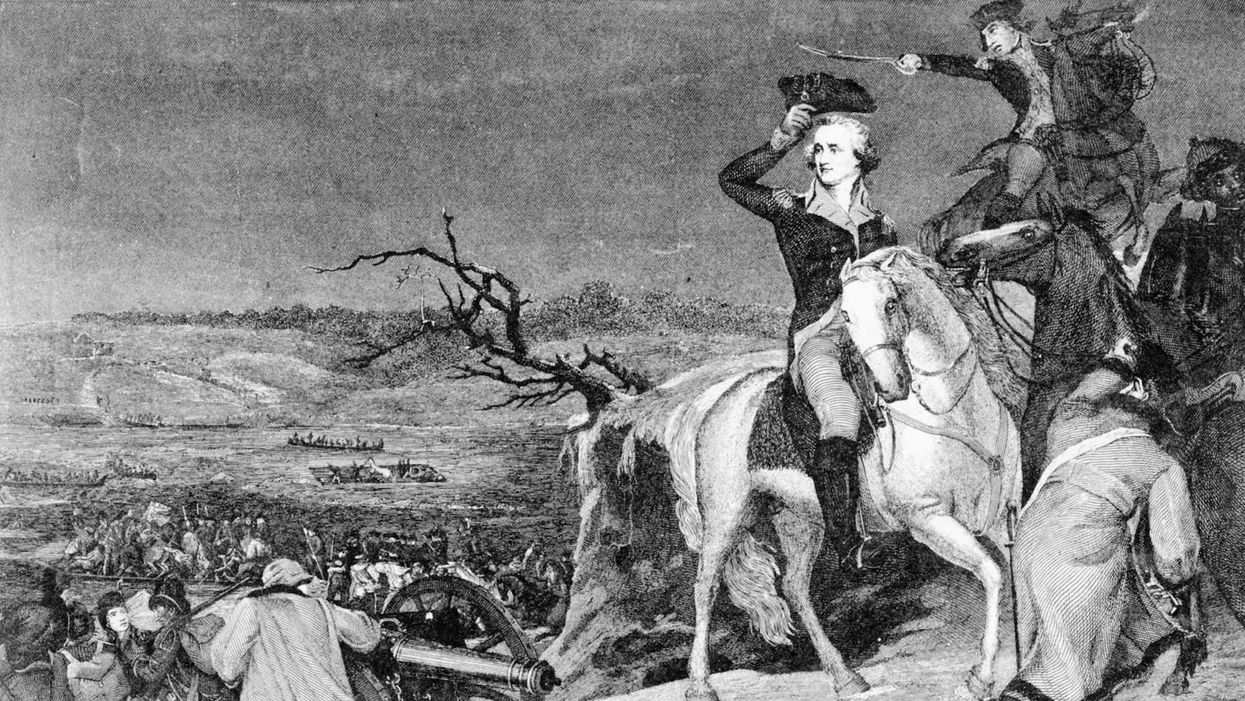
Gen. George Washington, on horseback, looks back upon his troops as they cross the Delaware River, near Trenton, New Jersey, Dec. 25, 1776. (Photo by Interim Archives/Getty Images)

Editor's note: In order to allow our staff to enjoy the 4th of July holiday with their families, TheBlaze will be running a series of articles today commemorating the Revolutionary War, which won America her freedom. God bless America, and all of you.
TRENTON, NEW JERSEY (JANUARY 3, 1777) — In an astonishing turn of events, the Continental Army, led by Gen. George Washington, has scored a much-needed victory in its fight for independence from the British crown. Multiple crushing defeats thus far in the Revolution has left the Continental Army's morale low, leading Washington to wonder how many of his troops might desert him, or not re-enlist.
Washington, aware that he needed a win, finally claimed victory on the morning of Dec. 26, 1776, in Trenton, New Jersey. The victory, along with the rest of the events that have unfolded during the last week have provided a much-needed boost to American soldiers' morale and has renewed their confidence that they can defeat the British in the ongoing war for American independence.
On Dec. 26, Washington decided to take advantage of the fact that the Hessians, the German troops whom the British hired to help fight against the Continental Army, were up late Christmas night celebrating.
Washington and his troops camped on the Pennsylvania side of the Delaware River. Outside, it was cold and snowy, and the river was covered with ice. But none of that stopped Washington and his 2,400 determined troops, who nevertheless set out to cross the icy river in blizzard conditions.
In an early morning raid on Hessian camps in Trenton, Washington and his troops fought for around one hour. They managed to capture more than 800 Hessian troops, and seized a considerable amount of their weapons, from musket and bayonets to swords and cannons, according to Washington's Mount Vernon estate.
American patriots hope that the Continental Army's morale-boosting victory in the First Battle of Trenton will be a critical turning point in the American Revolution.
According to reports, 22 British soldiers died in the First Battle of Trenton. Another 92 were wounded, 918 were captured and 400 escaped. The Continental Army, however, only lost two of its soldiers but only because they froze to death. Another five Americans were injured.
After their victory, Washington led his exhausted troops across the Delaware River back into Pennsylvania. But Washington still had his sights set on the next target, Princeton, New Jersey, where more British-allied forces had set up camp for the winter.
About a week later, on Jan. 2, 1777, Gen. Charles Cornwallis led his British troops from Princeton to Trenton to launch an attack. Washington directed a number of his troops to stave off an attack by blocking a bridge across the Assunpink Creek, according to sources in New Jersey.
Eventually, British troops decided to postpone their next attack until morning. Meanwhile, Washington, in his military genius, had another plan.
Washington instructed around 400 of his troops to stay at Trenton and keep the fires burning to trick the British into thinking they weren't on the move. But Washington sent the rest of his troops to travel on back roads to launch yet another surprise attack on the British, this time at Princeton.
The latter group, led by Gen. Hugh Mercer, met British troops at Stony Brook Bridge and thus commenced the Second Battle of Trenton.
The fight didn't start off well for the Continental Army. Washington and other reinforcements arrived, but the Continental Army still struggled. Then, in a show of admirable leadership, Washington rallied his discouraged troops who, at that point, were ready to retreat.
The American general rode up on horseback and blocked his men from leaving, creating a renewed sense of determination among his soldiers. Washington's encouragement later paid off, as some British troops retreated to Princeton and others to Trenton. Since most went to Princeton, though, Washington and the rest of his army followed.
The British eventually surrendered at Princeton after being surrounded by American troops at Nassau Hall. More than 80 British soldiers were either killed or injured.
Forty American soldiers died or were wounded, according to the state of New Jersey.
In the coming weeks, Washington and his troops are expected to continue to march on British and British-allied soldiers in the fight for independence from Great Britain.